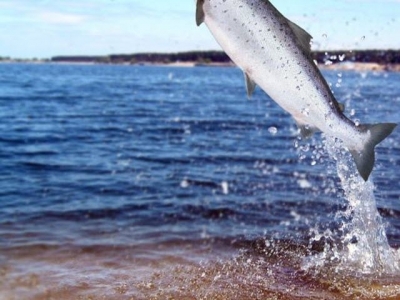Vaccines may not be protecting farmed fish from disease

Study shows how parasite in fish can override protective effects from a vaccine for another disease.
The vaccines used by commercial fish farmers are not protecting fish from disease, according to a new study compiled by researchers at the University of Waterloo in Ontario, the Pontifical Catholic University of Valparaiso and the University of Valparaiso in Chile.
The study found that vaccinated fish tend to show more symptoms when contracting diseases, with health effects and, ultimately, deaths occurring as if the fish had never received a vaccine.
"Today's vaccines are marketed to fish farms as necessary disease prevention and are even required by some insurance companies, but they are not nearly as effective as needed under real-world conditions," said Brian Dixon, a University of Waterloo biology professor. "Some operators are giving five vaccinations per fish, and then there are fish losses from the stress of receiving multiple handlings and injections."
In the study, the researchers tested the efficacy of the vaccine for the bacterial pathogen Piscirickettsia salmonis by comparing the reaction of vaccinated and non-vaccinated Atlantic salmon when exposed to the sea louse Caligus rogercresseyi in the lab.
They found that although the number of bacteria living inside the fish was much lower in vaccinated fish, they showed many more signs of infection and a higher death rate compared with the unvaccinated group upon exposure to the sea lice.
The study concluded that once vaccinated, the salmon were unable to fight off multiple diseases at once. It's the first study showing how a parasite in fish can override the protective effects of a vaccine for another disease, the announcement said.
These findings are supported by the experience of salmon farmers in Chile, where salmon are raised largely in open cages off the coast, exposing them to variety of pathogens and parasites -- the most common of which is sea lice.
The researchers said this highlights the need for veterinary pharmaceutical companies to change how they design and test vaccines in the first place, recognizing how different a fish's immune system is from the current human model.
"Fish have a limited number of resources to respond to an illness, so their immune system makes choices. When they're infected by sea lice, for example, the fish's immune system is suddenly geared to respond to that specific threat, leaving them totally exposed to other threats like P. salmonis," said Dixon, a Canada research chair in fish and environmental immunology. "It's like sending ambulances out to all emergencies when, in fact, some of those emergencies need firefighters."
In 2008, Chile's farmed salmon industry was nearly wiped out by infectious salmon anaemia virus. Since then, salmon farmers have been turning to vaccines to lower their use of antibiotics while preventing devastating losses from recurring disease, the announcement said. However, vaccinations are expensive and can cost Chilean operators as much as 30% of cost of raising each fish.
The findings appeared last month in Scientific Reports, a Nature journal publication.
Có thể bạn quan tâm
 Action plan for development of shrimp industry promulgated
Action plan for development of shrimp industry promulgated The Prime Minister has recently promulgated the National Action Plan for the Development of the Shrimp Industry through to 2025.
 2018: seafood exports will have a breakthrough
2018: seafood exports will have a breakthrough Overcoming the export value of $US 8 billion in 2017 is an important step, marking the dramatic development of the fisheries industry in Vietnam
 “King of pangasius” suffers heavy loss
“King of pangasius” suffers heavy loss Hung Vuong Joint Stock Company (HVG)’s consolidated audit statement for the fiscal year 2016-2017 has reported a negative after-tax profit of VND705 billion